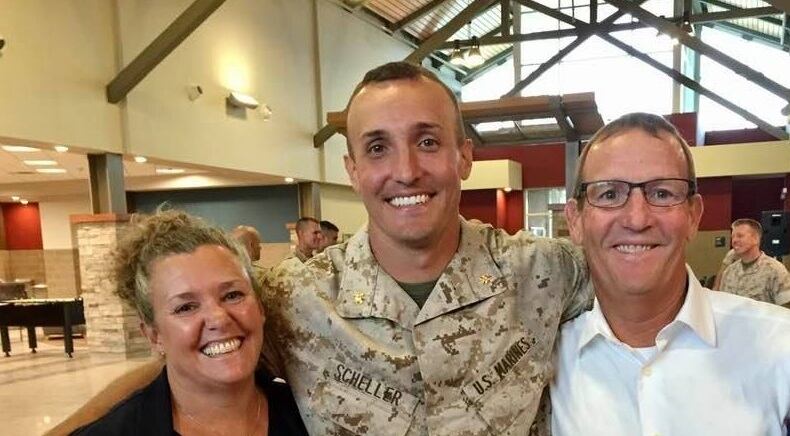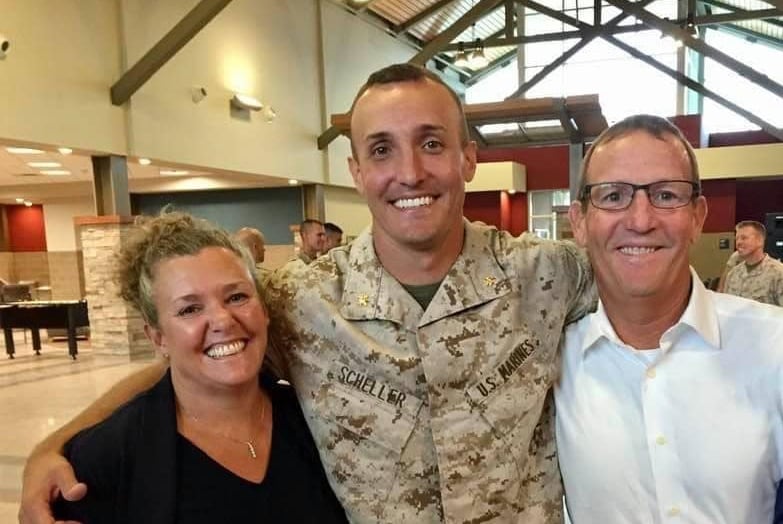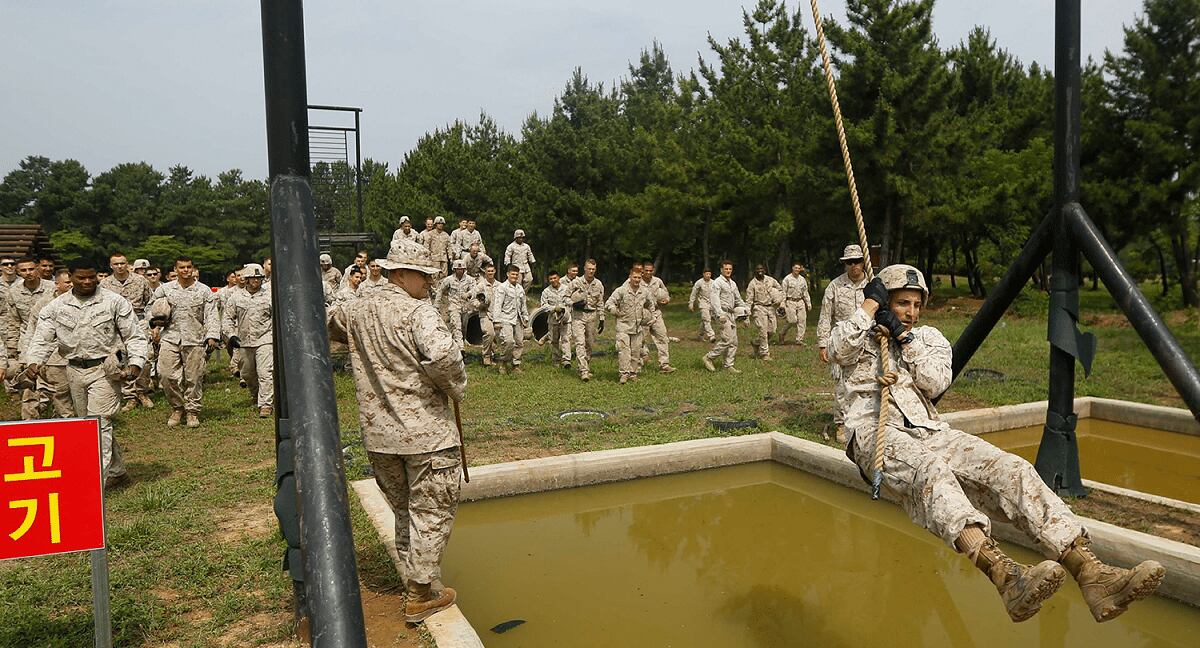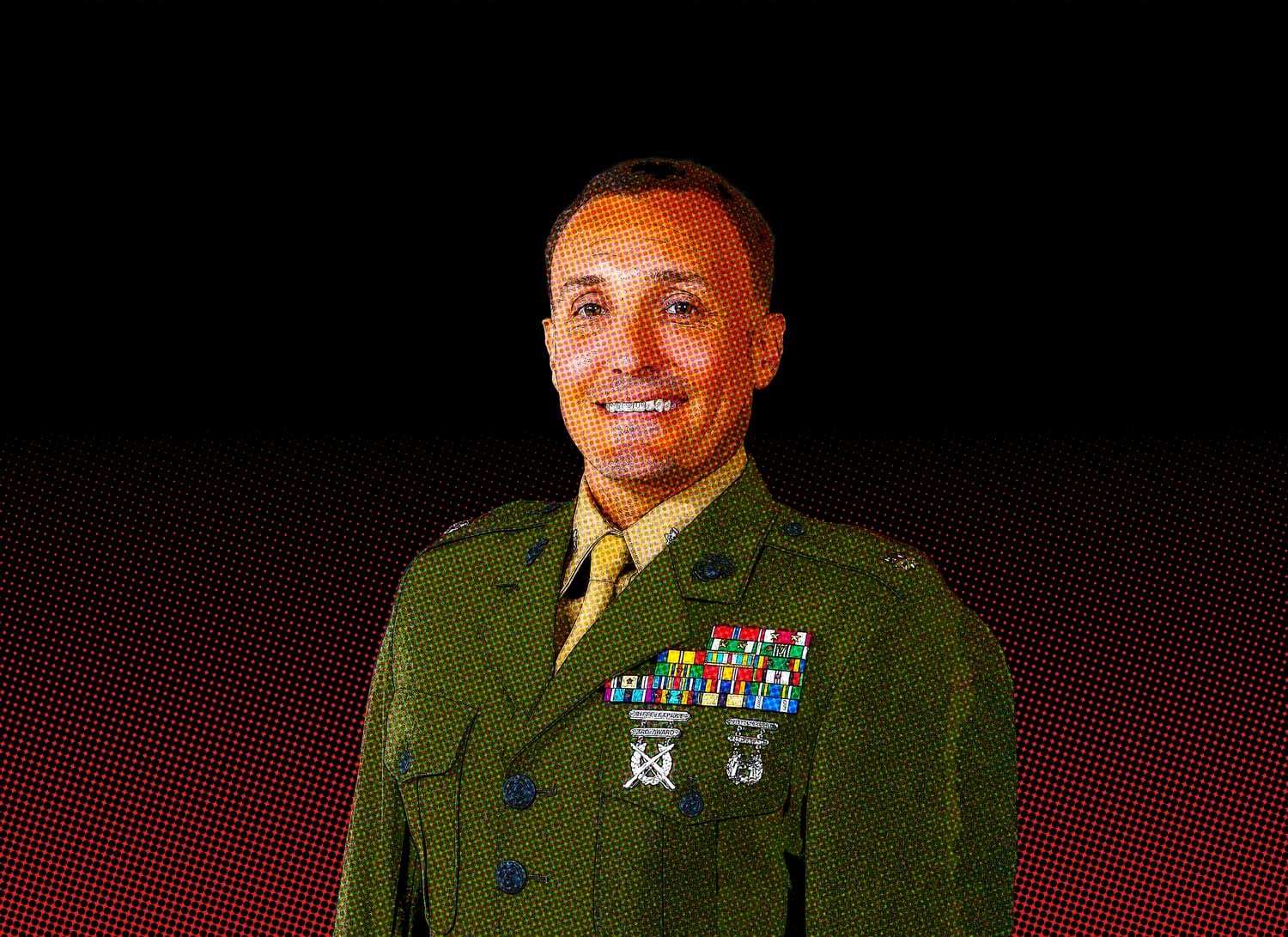It was late spring 2004. Stuart Scheller, a freshly minted accountant and recent University of Cincinnati graduate, was watching images on television of Marines in Iraq moving street-to-street during the 1st Battle of Fallujah.
It brought him back to 2001, when, as a freshman in college, he had watched the Sept. 11 attacks on TV, resisting the urge to enlist so that at the request of his parents he could finish his college degree.
He was the son of a career businessman, and one day wanted to join the FBI. But, deep within him, Scheller decided that his place was leading Marines on “the edge of the Empire.”
“I just thought I could go into the FBI anytime,” Scheller told Marine Corps Times in a phone interview. “But, this war may not always be going on, and I wanted the opportunity to serve my country. So, I called the Marine recruiter and started my path.”
By January 2005 Scheller was in officer candidate school. And just a little more than a year after his first call to a Marine recruiter, Scheller got his wish.
In January 2006, he was a freshly minted Marine Corps infantry platoon commander, entering the combat forces on the eve of the costliest stretch of American involvement in the Global War on Terrorism.
Growing up
Scheller’s choice to join the Marines was a bit of a surprise, according to his parents. But it didn’t come as a total shock either.
Growing up in the Midwest, principally outside of Cincinnati, Ohio, Scheller excelled both athletically and academically, traits the Marine Corps covets during the officer recruitment process.
“Stuart was an all-state Ohio soccer player in high school,” Stuart Scheller Sr. said. “Stuart was always a straight-A student, very intelligent.”
While Scheller’s parents had never been in the military, his family boasts a long history of military service.
According to his mother, Cathy, her family has had an ancestor fight in every U.S. war except Vietnam dating back to the Revolution.
More immediately, Scheller’s paternal grandfather — whom Scheller Sr. said Scheller was very close to and who imbued a sense of duty and service on him as a child — landed on Omaha Beach in Normandy, France, during World War II.
“He knew that my dad was very proud of him just for being a good student and for his athleticism,” Scheller Sr. told Marine Corps Times in an October 2021 interview. “He probably wanted to make my dad proud as well by joining.”

Although Scheller had expressed interest in the Marine Corps to his parents in the year 2000 out of high school and again after 9/11, it still was a shock to them when he ultimately decided to join in 2004. After all, the war in Iraq was heating up, unbeknownst to the family that the bloodiest years were still to come.
“He said, ‘I know what I don’t want to do, Dad, I don’t really want to be an accountant,’” Stuart Scheller Sr. said. “And I’m thinking, ‘Holy cow, he just spent four years in college, with an accounting degree.’ But, he wanted to join the Marine Corps, and we completely supported him.”
Despite the risks to life and limb and the move into a career field Scheller Sr. had little familiarity with, he knew his son would do well. Stuart Scheller Jr. had proven himself a leader on the athletic field and in the classroom. And his father knew he had imbued his own strong leadership philosophy onto his son.
RELATED

Scheller Sr. has a track record of success, working at the business executive level for nearly 40 years. That includes spending more than 20 years running a health care consulting business, where he provides executive coaching and leadership counseling.
Stuart Scheller Sr.’s core philosophy, passed onto his son, is based on “managing down to your people and lifting them up” while helping them “grow” and “improve” and “leaders lead by example.”
In short, leaders are accountable to their people, he says.
Time in the Corps
Scheller Jr. checked into his first unit, 1st Battalion, 8th Marine Regiment, in early 2006 and received an instant eye-opening into the realities of warfare.
As he stood in front of his platoon for the first time, he noticed that many of them were wearing sweatsuits rather than the prescribed uniform of the day. Scheller asked his platoon sergeant why.
“He said, ‘Sir, they all have doctor’s notes because they all have shrapnel still in their body from the push through Fallujah,” Scheller recounted. “That was the moment for me to say, ‘This is real.’ Just like the weight of the world hits you with the responsibility.”
However, when it came to combat Scheller would have to wait.
His first deployment with 1st Battalion, 8th Marines, in 2006 was as part of a Marine expeditionary unit. Although they trained in Kuwait and evacuated noncombatants from Beirut that year, as a whole the battalion did not deploy into Iraq.
The year 2007 though, was a different story.
In September 2007, the Marines of 1/8 received orders to Ramadi, Iraq — in the heart of the Sunni “triangle of death” and carrying the reputation of one of the most violent cities in Iraq.
Now a company executive officer in Alpha Company, 1st Battalion, 8th Marines, Scheller immediately made an impression as a leader, Matt Underhill, a former platoon commander in the same company, told Marine Corps Times.
“Stu is just one of those solid leaders that you just felt good about the direction of Marine Corps when you met Stu and worked with Stu,” Underhill said. “This is what I was hoping for amongst my peers and amongst whomever’s leading me.”
Underhill said that Scheller developed a personal relationship with all his subordinate leaders. This, in turn, made Underhill’s job, the company commander’s job and the life of the Marines in their charge “easy.”
Additionally, Underhill mentioned a thread that would become relevant nearly two decades later: accountability up and down the chain of command, with Scheller at the center.
“He would hold us accountable,” Underhill said. “He would hold himself accountable. I mean, I honestly feel like if the need had arisen, he would have held the company commander accountable.”
Underhill added that Scheller was neither a “maverick” nor a “cowboy” when it came to his professional style. Rather, his opinion, Scheller Jr. was very much “by the book,” but with a personal style that built confidence and respect from those around him.
“He was always putting the Marines, and I’d say the junior Marines ahead of him. It was that selfless servanthood leadership.” Underhill said. “Commanders wish they had more guys like Stu. I won’t say subordinates, but his junior Marines wished they had more leadership like Stu.”
Following the unit’s return from Iraq, Scheller continued to see his star grow as a leader in the Marine Corps.
From 2008–2010 he served as a company commander at the School of Infantry–East, located at Camp Lejeune, North Carolina, where he oversaw the combat development of enlisted Marines.
Wanting, in his words, to experience Afghanistan, Scheller accepted an individual augmentation billet with the Joint Improvised Explosive Device Defeat Organization.
From June 2010–July 2011, Scheller deployed to Afghanistan with the Army as part of that group, assisting in developing counter-IED techniques. His efforts with the Army overseas led to the award of a Bronze Star Medal, along with an Army Commendation Medal.
Upon his return from Afghanistan in 2011, Scheller was selected to attend expeditionary warfare school in Quantico, Virginia, where he earned a master’s degree in military science and operational studies.
The-now Capt. Stuart Scheller assumed command of a Marine Corps infantry company with 3rd Battalion, 2nd Marine Regiment, aboard Camp Lejeune, North Carolina, and headed out to sea on another MEU deployment.
Michael Welter, then a corporal under Company Commander Capt. Stuart Scheller, said the Marine immediately stood out.
“He was a leader,” Welter told Marine Corps Times. “He was fair, and he was emotionally and mentally invested in the success of the human beings below him. Not just as a Marine, but as a human being.”
Welter described how Scheller’s leadership style resonated well among the junior enlisted at sea. In short, Welter said, Scheller regularly would come to their berthing area with no specific motive other than to see how his Marines were doing.
“The berthing area, just kind of the living spaces suck,” Welter said. “But he’d still come in and be like, ‘Hey, how you guys doing?’ … Literally would sit down just chit-chat. Making sure everybody’s doing fine.”
Scheller always was asking if his Marines needed anything for training, logistics or simply improving their quality of life, Welter said.
“For an 0-3 to do that is that says a lot,” Welter said. “Not only about the culture that he was trying to build in his company, but also about him as a human being.”
Scheller’s reputation as a competent officer and leader of Marines resulted in him being selected to train future Marine officers at officer candidate school and The Basic School. As a rule, the Marine Corps invests its best talent into its training programs.
Retired 1st Sgt. Dale Barbitta first met Scheller while working at OCS in 2012. However, it wasn’t until 2019 that he worked directly with Scheller when the two were assigned to Marine Special Operations Command.
Barbitta, who in 2019 was about to retire from the Marine Corps, spoke bluntly about the type of leader Scheller was.
“If I could have guaranteed that he would have been my battalion commander, or I would have worked in the same command as Stu, I would have stayed in,” Barbitta told Marine Corps Times.
Barbitta said that leaders in the Marine Corps such as Scheller are few and far between.
According to him, Scheller allowed those under his command the flexibility to make their own calls, so long as the mission, whatever it was, ended up accomplished.
One of the things Barbitta most appreciated about Scheller’s leadership was his emphasis on communication both up and down the chain of command, which Barbitta said allowed all Marines in the chain of command to feel valued and involved.
Scheller showed humility when he arrived at MARSOC, Barbitta said.
Scheller, who came from a conventional infantry background, understood how ranges and other training exercises were conducted differently in MARSOC.
Scheller maintained a “first to arrive and last to leave” mindset and dedicated his efforts to enabling his Marines. Further, he constantly asked his senior enlisted how conventional tactics translated or didn’t into the world of MARSOC.
“He’s just a great f*cking leader,” Barbitta said.
He’s ‘not a hothead’
The final stop in Scheller’s Marine Corps career was back at Infantry Training Battalion in North Carolina.
From June 2021 until his firing following his public cry for accountability went viral in late August, he served as battalion commander.
While Scheller says that the attack in Kabul, which claimed the lives of 13 service members, including 11 Marines, sparked him to speak out on Aug. 26, 2021, the rationale behind it was more complicated.

Scheller says that as he began to receive text messages regarding the fallen, including some Marines he knew, he felt in his gut that the “failure” of the withdrawal in Afghanistan was never going to be addressed by senior leadership and that the conduct of the entire war would never be called into question.
“I sat there in my chair and thought, ‘I don’t think senior leaders get it,’” Scheller said. “I don’t think they understand the failures. I can’t think in military history, at least over the last 30 or 40 years has been such a monumental failure, and not one person has acknowledged it.”
Additionally, Scheller felt that the only way that there would be even an attempt at accountability for the withdrawal would be for him to speak out publicly just one time.
“I thought, ‘I’ll make one video,’” Scheller said. “I’ll explain some of the things that I think they should have done and demand accountability because that’s what I think we deserve.”
There has been much public speculation regarding Scheller’s decision to go public. He sacrificed his Marine Corps career, a retirement he spent 17 years working toward, and in his words, the move cost him his marriage. However, the Marines that spoke with Marine Corps Times didn’t see Scheller’s public call as such.
Barbita, who worked with Scheller until mid-2020, a little more than a year before Scheller went viral with his demands for accountability, described Scheller as very deliberate and calculated. Barbita described Scheller as someone who, when making decisions, would consult multiple opinions before making a decision.
“He was very, he’s very conscious of his thoughts and actions,” Barbita said. “He’s very, I mean very, methodical with his decisions.”
Underhill saw Scheller as an officer destined to be a career Marine, possibly rising to general or higher. Further, he described Scheller as a “stone-cold professional” who is very “calm, cool and collected.”
“Stu is not a hothead,” Underhill said. “So, if Stu is upset by the current situation and the lack of accountability — America needs to listen.”
Read Part 2: ”The unmaking of Lt. Col. Stuart Scheller.”
RELATED

James R. Webb is a rapid response reporter for Military Times. He served as a US Marine infantryman in Iraq. Additionally, he has worked as a Legislative Assistant in the US Senate and as an embedded photographer in Afghanistan.




